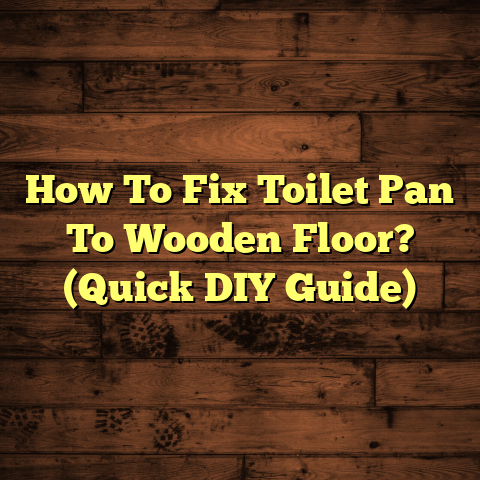How to Eliminate Pet Odor From Hardwood Floors? [Quick Fix!]
Warning: Pet Odor on Hardwood Floors Can Become a Nightmare!
As a flooring contractor and a pet owner, I can tell you that dealing with pet odors on hardwood floors can be a daunting challenge. I’ve seen firsthand how quickly those lovely floors can turn into a source of embarrassment and frustration when they start to smell like, well, pet. The good news is that there are effective ways to tackle this issue. I’ll share my experiences, tips, and tricks that have worked for me over the years, along with some stories that illustrate the ups and downs of maintaining a pet-friendly home.
Understanding the Problem
When your furry friend has an accident, it’s not just a matter of cleaning up the mess. The real issue lies in the odor that can linger long after the stain has been removed. This is especially true for hardwood floors because they are porous and can absorb liquids, leading to persistent smells.
I remember the first time my dog had an accident on my newly installed hardwood floor. I thought I had cleaned everything up, but days later, I could still smell it. That’s when I realized that simply cleaning the surface wasn’t enough. After talking with fellow contractors and doing some research, I learned that most common household cleaners simply mask the odor rather than eliminate it.
Step 1: Act Quickly
The key to preventing long-term odors is to act quickly. As soon as you notice an accident, grab some paper towels or an old cloth and blot the area. Don’t rub it! Rubbing can push the urine further into the wood grain. After soaking up as much liquid as possible, it’s time to move on to cleaning.
For me, having a designated cleaning kit for pet accidents has been a lifesaver. I keep it stocked with paper towels, vinegar, baking soda, and enzymatic cleaners. This way, I’m always prepared when an accident happens.
Step 2: Cleaning Solutions
Homemade Solutions
From my experience, homemade solutions can be incredibly effective. Here are a couple of my go-to recipes:
- Vinegar and Water: Mix equal parts white vinegar and water in a spray bottle. Spray the affected area and blot with a clean cloth. Vinegar neutralizes odors and is safe for hardwood floors.
- Baking Soda: After cleaning with vinegar, sprinkle baking soda over the area once it’s dry. Let it sit for a few hours or overnight to absorb any remaining odors. Vacuum it up afterward.
These methods have saved me countless times. I once had a particularly stubborn stain from my cat that resisted all efforts until I used both vinegar and baking soda. The combination worked wonders!
Commercial Products
While homemade solutions work wonders, sometimes you need something stronger. I’ve tried various commercial products designed specifically for pet odors. Look for enzymatic cleaners that break down the proteins in urine. These are often more effective than regular cleaners.
One product I found particularly useful was an enzymatic cleaner called Nature’s Miracle. It worked effectively on both fresh and older stains. However, I’ve also tried some other brands that didn’t deliver as promised, so it’s essential to read reviews and perhaps try a few before settling on one that works best for you.
Step 3: Deep Cleaning
If the odor persists, it might be time for a deep clean of your hardwood floors. I’ve used a steam mop in the past, but I learned that some hardwood finishes might not be compatible with steam cleaning. Always check with the manufacturer’s guidelines before proceeding.
If you do choose to steam clean, ensure that the mop isn’t overly wet, as excess moisture can damage hardwood floors. When I was working on a client’s house that had seen better days due to pet accidents, we decided to try steam cleaning after trying various other methods without success.
It was a bit of a gamble since their floors were older and had some wear and tear already. But we were pleasantly surprised; while it didn’t remove all odors, it significantly improved the overall scent in the house.
Step 4: Addressing Stains
Sometimes, pet accidents leave stains that need more than just cleaning. I’ve had success using a mixture of hydrogen peroxide and baking soda for stubborn stains. Just mix them until you get a paste, apply it to the stain, and let it sit for about 30 minutes before wiping it away.
If you’re dealing with a particularly tough stain, consider sanding the area lightly and reapplying finish if necessary. This can restore the wood’s appearance and help eliminate any lingering odors.
A while back, I worked on a project where the client had several deep-set stains from their dog. After applying the hydrogen peroxide paste and letting it sit, we found that we still needed to sand some areas lightly to remove the discoloration entirely.
Step 5: Prevent Future Accidents
Now that you’ve tackled the odors, how do you prevent future accidents? One of my best investments was a high-quality pet training pad. Sometimes accidents happen despite our best efforts. Training pads can help manage these situations while your pets learn where it’s appropriate to go.
Another method I’ve used is placing rugs or mats near commonly used areas like entrances or favorite resting spots. This helps catch any accidents before they reach your floors.
For instance, at home, I have mats by both entrances to limit dirt and moisture from being dragged in by my pets. It’s made a noticeable difference in keeping my floors cleaner and odor-free.
Step 6: Maintenance and Regular Cleaning
Regular cleaning is vital in maintaining your hardwood floors and preventing odors from building up. A simple weekly sweep and mop with a pet-safe cleaner work wonders.
I also recommend using FloorTally for planning out maintenance schedules and budgeting future cleaning products or services. It keeps everything organized and helps me estimate costs efficiently.
In addition to using FloorTally for organization, I’ve found tracking my cleaning schedule helps me remain consistent with floor maintenance. It’s easy to forget when life gets busy, but regular upkeep can save time and stress in the long run.
Step 7: Professional Help
If all else fails and odors persist despite your best efforts, it may be time to call in professionals. They have specialized equipment and techniques that can address issues you might not be able to handle on your own.
I once had a client whose home smelled terrible due to pet accidents over several years. After trying everything they could think of without success, they called me in for help. Using an ozone generator and professional-grade cleaners, we managed to restore their hardwood floors back to their original glory.
Tips and Tricks
- Always Test Cleaners: Before applying any cleaner to your hardwood floors, test it on an inconspicuous area first to ensure it won’t damage the finish.
- Stay Ahead of Odors: If your pet is prone to accidents, consider using an air purifier to help combat lingering smells in the air.
- Regular Inspections: Regularly check potential problem areas in your home for stains or odors so you can address them before they become significant issues.
Exploring Different Flooring Solutions
While hardwood floors are beautiful and add value to any home, they do require special care when you have pets. The decision between hardwood flooring and other options like laminate or tile often comes down to personal preference and lifestyle considerations.
Laminate Flooring
I’ve worked with laminate flooring extensively over the years. Laminate can be more resistant to scratches and stains than hardwood, making it an attractive option for pet owners looking for something durable yet stylish. The cost of laminate flooring installation tends to be lower than hardwood too, which is another factor many clients appreciate.
However, laminate doesn’t provide the same warmth or classic look as hardwood floors do. Plus, if your laminate gets damaged from moisture or heavy impacts, repairs can be challenging since you often need to replace entire planks instead of refinishing.
Tile Flooring
Tile is another popular choice among pet owners due to its durability and ease of cleaning. Unlike hardwood, tile is impervious to water damage and odors if cleaned promptly.
That said, tile can be cold underfoot—something many people don’t consider until winter rolls around! Additionally, if you have large dogs who love running around inside, tile can be slippery.
Making Your Decision
Ultimately, whether you choose hardwood, laminate, tile, or another type of flooring will depend on your preferences and lifestyle as a pet owner. If you love the look of hardwood but are concerned about odors or stains from pets, consider investing in area rugs or mats that can catch accidents before they reach your floors.
It’s also essential to weigh cost versus benefit when making flooring decisions. Sometimes spending a little more upfront on high-quality materials can save you money in repairs or replacements down the road.
Conclusion
Dealing with pet odors on hardwood floors can be challenging but manageable with proactive measures and effective techniques. From my personal experience as both a flooring contractor and pet owner, I can confidently say that quick action, effective cleaning solutions, regular maintenance, and being prepared are key.
So next time your four-legged friend has an accident or you catch a whiff of something unpleasant wafting through your home, remember these steps! Staying ahead of potential issues will make all the difference in keeping your hardwood floors looking beautiful and smelling fresh—your nose (and guests) will thank you!

![Laminate or Vinyl for Uneven Floors? [Find Out Now]](https://floortally.com/wp-content/uploads/2025/01/Is-Laminate-Or-Vinyl-Better-For-Uneven-Floors.png)
![Hardwood Investment: Long-Term Care Secrets [Protect Now]](https://floortally.com/wp-content/uploads/2025/01/Longterm-Care-For-Your-Hardwood-Investment.png)
![How To Deep Clean Tile Floors With Vinegar? [Quick Guide]](https://floortally.com/wp-content/uploads/2025/01/How-To-Deep-Clean-Tile-Floors-With-Vinegar.png)

![Is Porcelain Tile Durable? [Must Know Facts]](https://floortally.com/wp-content/uploads/2025/01/Is-Porcelain-Tile-Durable.png)
